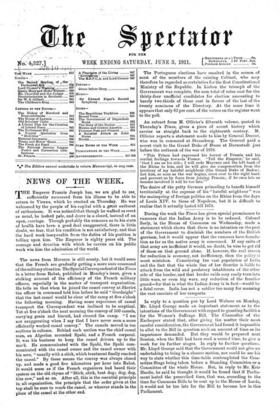The news from Morocco is still scanty, but it would
seem that the French are gradually getting a more sure command of the military situation. The Special Correspondent of the Times in a letter from Rabat, published in Monday's issue, gives a striking account of the efficiency of the French military officers, especially in the matter of transport organization. He tells us that when he joined the camel convoy at Skeriet the officer in command told him before he said "Goodnight" that the last camel would be clear of the camp at five o'clock the following morning. Having some experience of camel transport the Correspondent was inclined to be sceptical. Yet at five o'clock the next morning the convoy of 500 camels, carrying grain and biscuit, had cleared the camp. "I am not exaggerating. when I say that I have never seen a more efficiently worked camel convoy." The camels moved in ten sections in column. Behind each section was the chief camel man, an Algerian mounted Spahi, and a French corporal. It; was his business to keep the camel drivers up to the ma-k. He communicated with the Spain, the Spain com- municated with the camel owner and the camel owner with his men, "usually. with a stick, which treatment finally reached the camel." By these means the convoy was always closed up, and made a good five kilometres per hour into Rabat. It would seem as if the French organizers had based their system on the old rhyme of "Stick, stick, beat dog; dog, dog, bite cow," and so on. After all, this is the essential principle in; all organization, the principle that the order given at the top shall be sure to reach the camel, or whoever stands in the place of the camel at the other end.






































